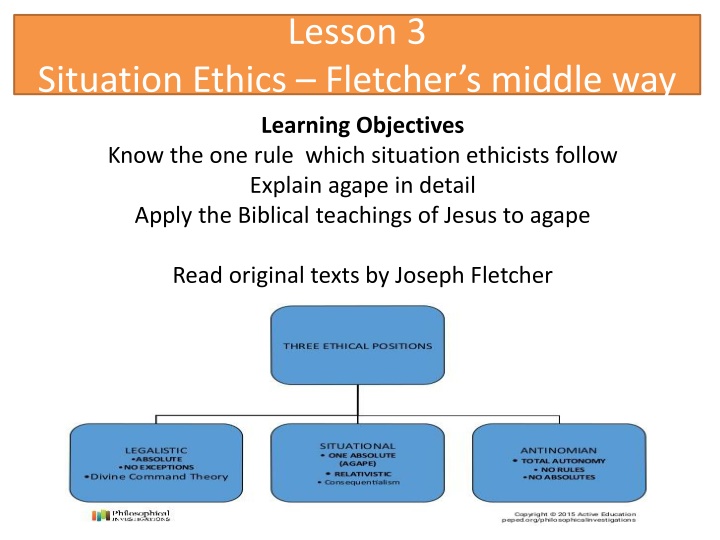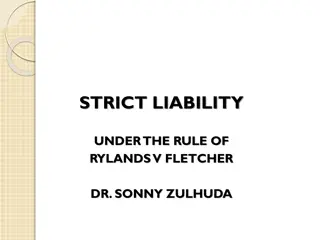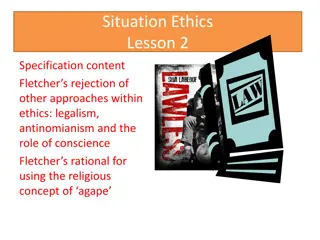Situation Ethics -Fletcher's middle way
Explore the core principles of situation ethics according to Joseph Fletcher, focusing on the concept of agape as the guiding principle of love. Understand the balance between legalism and antinomianism in ethical decision-making. Delve into the Biblical teachings supporting a situational approach to morality.
Download Presentation

Please find below an Image/Link to download the presentation.
The content on the website is provided AS IS for your information and personal use only. It may not be sold, licensed, or shared on other websites without obtaining consent from the author.If you encounter any issues during the download, it is possible that the publisher has removed the file from their server.
You are allowed to download the files provided on this website for personal or commercial use, subject to the condition that they are used lawfully. All files are the property of their respective owners.
The content on the website is provided AS IS for your information and personal use only. It may not be sold, licensed, or shared on other websites without obtaining consent from the author.
E N D
Presentation Transcript
Lesson 3 Situation Ethics Fletcher s middle way Learning Objectives Know the one rule which situation ethicists follow Explain agape in detail Apply the Biblical teachings of Jesus to agape Read original texts by Joseph Fletcher
Examples of legalism and antinomianism Starter In groups of three 1- Soloman Islands 2 Egypt 3 Central African Republic Read your article 1. What is each story about? 2. Which approach do the people display? 3. Do you think this approach seems to work? 4. What are the problems with this approach?
Summary When the Church give lots of rules for it s adherents, this is called LEGALISM When society has no rules to obey, and what someone does is based merely on the situation and intuition, this is called ANTINOMIANISM Can we think of examples in our society today where antinomianism and legalism can be seen.
Situational approach To Fletcher, Situation Ethics is the correct middle position between these extremes: Situation recognises one law or principle, one absolute norm, namely love. He goes on to say Situation Ethics is the responsible self deciding whether rules serve love or not. This is the situational strategy in capsule form .
Situation ethics Most commonly associated with Joseph Fletcher and J. A. T. Robinson, emerged at a time when society and the Church were facing drastic and permanent change.
Situationalism and agape All you need is love Read page 13 and complete task 7 on agape there is more information on page 17 Agape That humans will never fully know what is right and wrong That love is the most important ethic That love is an absolute law Relativist and consequentialist That it has no laws or precepts That reason leads us to love
Complete task 8- Bible Passages Situation Ethics remains a Christian ethic, despite it being critical of mainstream Christian approaches to morality which are often too legalistic. Luke 10:27 1 Corinthians 13 Additional teachings John 15:13 John 3:23 Hebrews 11:31
Plenary Discuss the situation on page 9 with your partner Read the original text by Joseph Fletcher 1 s answer question on legalism 2 s answer question on antinomianism 3 s answer question on situationalism Use your and mindmaps/notes
HomeworkExam skills task Explain why Fletcher rejected antinomianism and legalism for agape love. 30 marks Complete pages 13 -14
Explain why Fletcher rejects antinomianism and legalism in favour of agape love. [30 AO1] Antinomianism is the idea there are no rules, laws or principles which must be followed: the situation itself will provide the solution, which can be found through intuition. Fletcher rejected this because he said this would lead to moral chaos, anyone could do anything they liked. Legalism is a different type of ethical approach, which is based on following prescribed rules by which people can make every moral decision. Fletcher also rejected this because he said this type of system does not allow people the freedom to make moral choices and does not consider the situation they find themselves in. Fletcher said that we should base all our moral decision-making on the application of agape (selfless love) to each unique situation. One needs to act in a loving way even if that means breaking established moral rules/codes of practice. He aimed to achieve the Middle Way between the two extremes of antinomianism and legalism. He identified the principles to help people achieve this.
Before we start . . . Unscramble the key words Lehftcre Susje Ntcisog Meallgis Fletcher Jesus Gnostic Legalism
The Four Working Principles Read the Vardy and Grosch and WJEC booklet on the four working principles (125-127) Make notes on the Four WPS Devise a revision tool to help you remember the 4 working principles. E.g. Pick Ripe Plums Please Pragmatism pragmatic/practical - Relativism related to the situation not absolute Positivism - positive decision to put love first Personalism person first
Plenary Complete the key term matching activity on a separate A4 sheet























